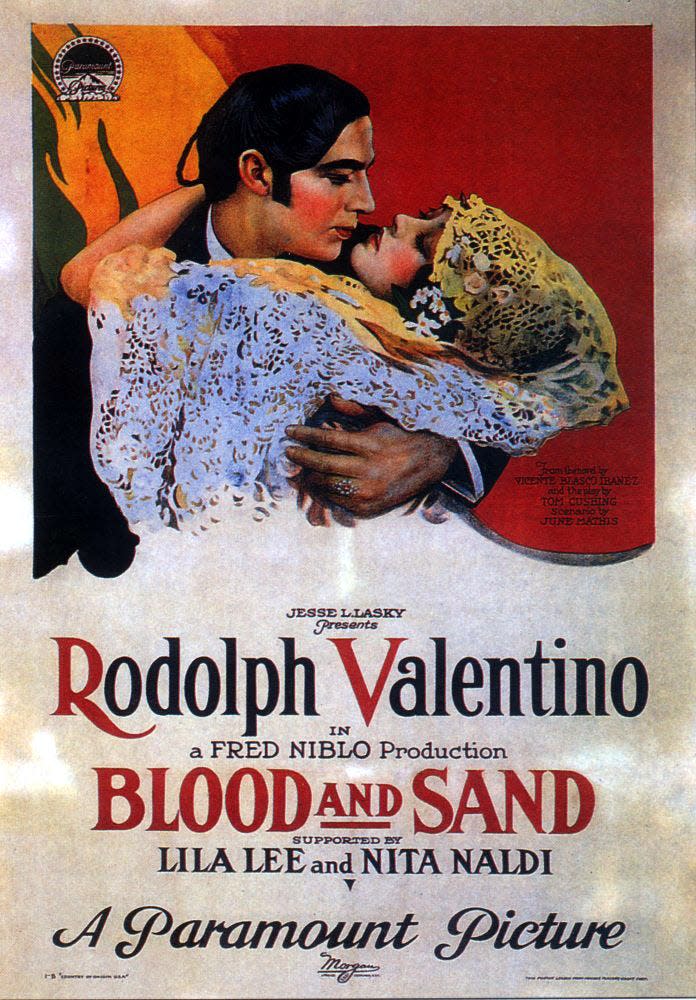Rudolph Valentino, Clark Gable and Cary Grant among early movie idols | Opinion
- Oops!Something went wrong.Please try again later.
- Oops!Something went wrong.Please try again later.
- Oops!Something went wrong.Please try again later.
- Oops!Something went wrong.Please try again later.
Movie matinee idols have been a part of life for the last 112 years, and there are many hot young stars today who keep the big screen ablaze with romance, comedy and action films. I see them as they make guest appearances on TV talk shows or watch their promos for a movie. But I don't know them as well as some of the stars of yesterday, when I spent a lot of time going to theaters.
It is interesting to note how the requirements for good-looking male stars change as the years go by. Some are sensitive, some are macho, some are careless daredevils and some just exude sex appeal. During my 80-plus years of watching them come and go, I realize that time and audiences dictate the flavor of the day.

I never saw Francis X. Bushman (1883-1966), who dominated the screen from 1911 until his death and was billed as "The handsomest man in the world." In 1912 Motion Picture Story voted him the most popular screen actor in America. and he earned $1 million dollars a year. President William Howard Taft said to him, "All the people love you, and I can't have even the love of half the people."
Another idol was Rudolph Valentino (1895-1926) who had a short life and a short time on the screen. He hade his first movie, "My Official Wife," in 1914, just three years after Bushman's first movie. He was known for "The Eagle" in 1925 and "Son of the Sheik" in1926 before he died of appendicitis at the age of 31.
Ail of his movies were made during the silent era, but he became a great romantic idol. One critic said, "His acting is largely confined to protruding his large, almost occult eyes until the vast areas of white are visible." Another credited him for "turning animal magnetism into at least the semblance of talent."
Hear more Tennessee voices: Get the weekly opinion newsletter for insightful and thought-provoking columns.
A third idol was Clark Gable (1901-1960), who was 23 years old when he made his first movie, "Forbidden Paradise," in 1924. Eighteen years younger than Bushman and six years younger than Valentino, he was known for his big ears and impudent grin. Billed as "The King of Hollywood," he swept female fans off their feet.
Although his first five movies were made in the silent era, his voice came through loud and clear in such films as "It Happened One Night" in 1934, "Mutiny on the Bounty" in 1935 and certainly in "Gone With the Wind" in 1939, when his character shocked audiences by telling Scarlett O'Hara, "Frankly, my dear, I don't give a damn."
Then there was Cary Grant (1904-1986), who was the epitome of sophistication. His first movie was "This Is the Night" in 1932, followed by 70 others. Critic Pauline Kael said, "Cary Grant is the male love object. Men want to be as lucky and enviable as he is, and women imagine landing him."
Space allows us to mention just three others in this category. Robert Taylor (1911-1969) made his first movie, "Handy Andy," in 1934. He was described as "handsome, durable and hard working. His boyish good looks turned rather set and grim in middle age, but he remained a star." Gregory Peck (1916-2000), who was five years younger than Taylor, first appeared in "Days of Glory" in 1943. Rock Hudson (1925-1986) made his first movie, "Fighter Squadron" in 1948. He also starred in several TV series.
Robert J. Booker is a freelance writer and former executive director of the Beck Cultural Exchange Center. He may be reached at 865-546-1576.
This article originally appeared on Knoxville News Sentinel: Opinion: Rudolph Valentino, Clark Gable among early movie idols

